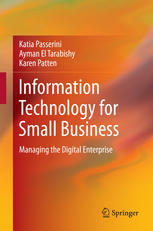

Most ebook files are in PDF format, so you can easily read them using various software such as Foxit Reader or directly on the Google Chrome browser.
Some ebook files are released by publishers in other formats such as .awz, .mobi, .epub, .fb2, etc. You may need to install specific software to read these formats on mobile/PC, such as Calibre.
Please read the tutorial at this link: https://ebookbell.com/faq
We offer FREE conversion to the popular formats you request; however, this may take some time. Therefore, right after payment, please email us, and we will try to provide the service as quickly as possible.
For some exceptional file formats or broken links (if any), please refrain from opening any disputes. Instead, email us first, and we will try to assist within a maximum of 6 hours.
EbookBell Team

4.4
72 reviewsInformation Technology for Small Business: Managing the Digital Enterprise provides an overview of how small and medium business enterprises (SMEs) can use flexibility, agility, and anticipation strategies to better utilize information technology and knowledge management. Because small and medium businesses tend to be late technology adopters, they could miss versatile and strategic workforce advantages that enable them to achieve higher efficiency and effectiveness through technology.
This book shows these SMEs new technology trends that can transform the nature of their operations both in an evolutionary business path and through revolutionary opportunities. Information Technology for Small Business: Managing the Digital Enterprise applied correctly to small and medium business can be used as a strategic tool to reach growth and profit goals for the SMEs competing in a very dynamic and global marketplace. Examples include: identifying ways that IT can be used to develop strong relationships with customers and suppliers, and how to select the best technologies for business needs.
Information Technology for Small Business: Managing the Digital Enterprise targets SME owners, educators, and practitioners working in the related fields of management, IT, IS, and CS-related disciplines. Advanced-level students and policy makers focusing on SMEs will also find this book valuable in terms of main concepts for discussion.